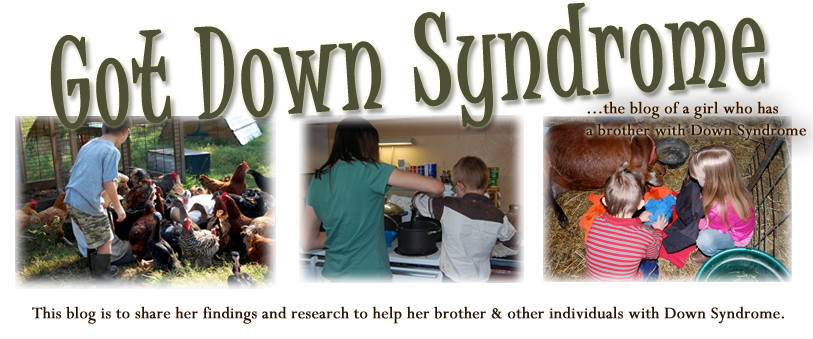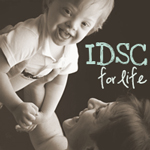I thought I would share a few articles from our book over the course of the month. One article in the first section of the book is written by Jenny Marrs. She's the mom of a teenage boy with DS. She has done a lot of work for kids with DS, but especially her son and pushing to his highest potential. She is well known (especially by the "old-timers" on there) on the Einstein-Syndrome list.
By Jenny Marrs
John is 13 years old and has Trisomy 21 Down syndrome. He took his first steps at 13 months, and began reading at 2 ½. He knew all the alphabet and numbers by age 3, and was fully potty trained before his 3rd birthday. Prior to Kindergarten, John was tested in word recognition to be at a first grade 6th month level. In Math, he tested at a Kindergarten 6th month level. Today he continues to excel in a regular 7th grade classroom doing the same work as his peers.
John is not the only child with Down syndrome achieving such accomplishments within typical time frames. John is merely doing the things all children with Trisomy 21 are capable of accomplishing—provided they have not acquired medical or other complications which could affect learning capabilities. Some complications that could affect learning capabilities are untreated thyroid, hearing or vision disorders, autism, brain damage, attention deficit, fetal alcohol syndrome or constant upper respiratory infections. I do not believe that there exists a range of functioning in persons with Down syndrome merely due to the 47th chromosome. I believe every child with Down syndrome is capable of reaching for the stars. It is crucial that parents believe this, and then help their children to achieve this goal.
For the most part, in today’s world, I do not see a society that believes in what the child with Down syndrome can do. The available information is outdated and there is an abundance of old stereotypes and misconceptions among professionals---professionals who should know better. Parents have a hard job helping their child reach for the stars because they go against what most educated professionals think and say. I began this journey by thinking that John would teach THEM and that we would be opening some eyes. Some have been opening, but very, very slowly. In general, rather than give John the credit for his hard work, most just like to shrug and say, “He’s high functioning Down syndrome.” In reality, John’s function is a reflection of the opportunities he has been given and the hard work he has done.
I think the biggest burden on our children today is the many labels put on them, beginning with “Down syndrome”. In 1865, Langdon Down observed these children and made a list of symptoms that he felt made them different from other children. The word “syndrome” is defined as “a list of symptoms”. Because of this list made in the year 1865, our children are burdened at birth with this label and list. This label/list is why many people look at John but can’t see the child. This is why some of his past doctors were willing to accept illness for him, and it didn’t even occur to them to attempt wellness. This is also why most of society has so many misconceptions about Trisomy 21. Down syndrome is a label that suggests symptoms that may or may not be there; symptoms that CAN be addressed and for the most part eliminated.
John has a medical diagnosis of Trisomy 21. Research tells us that there are metabolic issues we need to address to prevent the extra chromosome from wreaking havoc on John’s system. We address this issue. However, John does not now carry nor will he ever carry labels designed to hold him back. We know his many strengths as well as his weaknesses. This allows us to address each issue as it pertains to John. Not as it pertains to an entire segment of the population. Not as it pertains to a study, and not based on past performances of various children in various situations. Just John.
Another injustice to our children is the developmental chart suggesting almost everything will be later. Buy into that thinking, and everything is almost certain to be later. Because of low muscle tone, John did need more help to accomplish gross motor milestones, but we did accomplish them in a typical time frame. I believe in the importance of the “windows of opportunity”, and I believe those windows are the same in all children. I believe that the child who develops within those windows of opportunity has an edge. The professionals that I first looked to for guidance, my doctor, therapists, and Early Intervention providers, all accepted the “special” charts, and did not strive for a normal development. Normal development would not, in most of society’s eyes, be realistic. “Reality” to them was that John had Down syndrome, and their education and experience had taught them to expect less. My reality and experience tells me that if you expect less then less is exactly what you will get!
Because of low expectations, professionals are stifling our children’s potentials. It begins at birth and continues throughout our children’s lifetimes. As it turns out, the child fulfills all of those dire predictions, not because that was his potential, but because he was educationally deprived by a very archaic system.
Granted, society has come a long way from the days when the child with Trisomy 21 was institutionalized, but we haven’t come nearly far enough. We have advocate groups whose goals are to have society accept our children’s disability. Society is much TOO willing to accept disability. I not only want society to see John, I want society to see John’s potential. Just look at the list of symptoms that a child with Down syndrome is expected to have. Next look at the description of Down syndrome in the American Medical Association medical book. These do not describe my child. This tells me that we have a long way to go. These are examples of society’s opinions. This is what is taught to our future professionals. This is how they view Trisomy 21. I will not put my child’s health or educational welfare in “society’s” hands. “I will not let his schooling interfere with his education.” (Mark Twain)
I am tired of seeing television shows that are intended to make people feel all warm and fuzzy because they accept individuals with Down syndrome and their so-called disability. I want to see television programs that concentrate on ability, and will educate the public about our children’s true potential. When John was an infant, care providers leant me a video portraying a child with Trisomy 21 who was included in a typical classroom. Instead of focusing on a child beginning his school career, this video takes an older child who has been educationally deprived and who lacks discipline, and then follows him through the school year. The truth is, the child with Trisomy 21 is capable of learning at an equal or above average rate. Why do we accept educational deprivation for the child with Trisomy 21?
I think most children with Trisomy 21 display signs of having difficulties with speech, and this makes it all the more difficult for people to see their potential. This speech delay, coupled with society’s misconceptions, leads to greater misunderstandings. If a child has a hard time presenting his knowledge through speech, it is hard for anyone to grasp how smart he is. John had a very large vocabulary when he entered Kindergarten, but he had a hard time making sentences. He was not confident with speaking, so he spoke very little. Naturally, people made incorrect assumptions and judgments based on this child with a speech delay, and a label of Down syndrome. When I told people of John’s reading capabilities, it was as if their eyes would glaze over. They smiled. They were polite. Finally, they changed the subject. I found that I needed to make videos for these people, or provide the opportunity for John to prove his capabilities in person. Then the mouths would drop open, and they would ask, “How did he do that?”
My heart goes out to the many children who have suffered because of society’s misconceptions. These children have such wisdom to share and yet are unable to because they have a speech difficulty, and because society has a listening disability. These children know that we are stifling their potential. They know so much more than we can even grasp, possibly because they are content to be silent and listen, which is the avenue to true wisdom.
We need to believe what these children can do; we need to help them achieve their potential. Remember, the syndrome doesn’t have to happen. When society sees the extra that is in these wonderful children, they will perhaps change their tendencies to labels that predict doom. Perhaps an amniocentesis that suggests Trisomy 21 won’t be seen as an opportunity to make a choice. Rather, this child will be seen as the gift that he is; a child with more, not less; a child who will teach us more than we will ever dream of teaching him. This child touches the heart in a very special way, and has a profound message for those who have the wisdom to listen.

Tweet























3 comments:
Wonderfully put! I don't have other children - Samantha is my only one, and I treat her the only way I know how, like I expect I would treat any other child, and she is *thriving.* Loved this.
What a wonderful post! Our son with DS is 19 months old and we are working so very hard to help him maximize all of his potential! Your post really helped to remind me that the only limits my son has are the ones I allow anyone to put on him. Thank you!
What a wonderful post! Our son with DS is 19 months old and we are working so very hard to help him maximize all of his potential! Your post really helped to remind me that the only limits my son has are the ones I allow anyone to put on him. Thank you!
Post a Comment